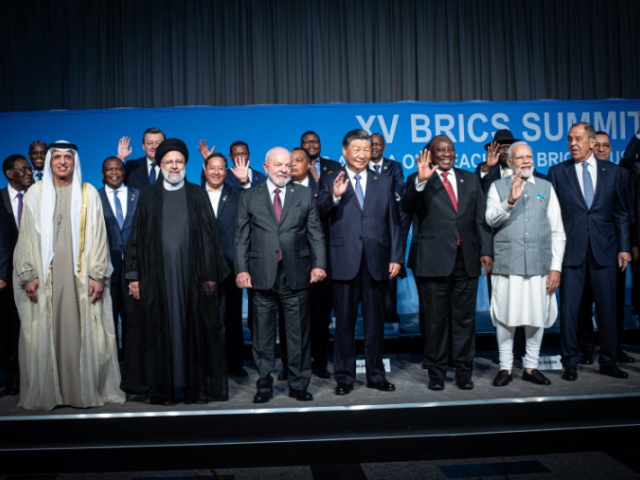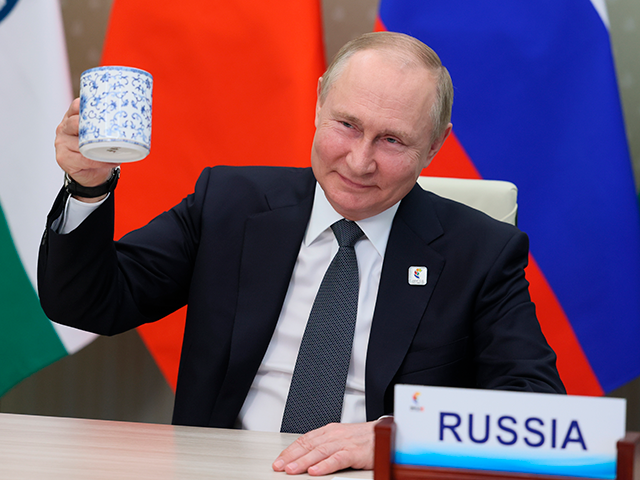The Chinese Foreign Ministry declared itself “fully confident in the BRICS’ future” on Tuesday following Argentina’s rejection of membership in the trade and security alliance.
BRICS is an acronym for the five original members of the group: Brazil, Russia, India, China, and South Africa. The alliance’s members focus on economic cooperation – to protect its rogue human rights violations, such as Russia’s and China’s, from Western sanctions – and mutual diplomatic support at the United Nations and other international venues.
In August, the BRICS coalition announced that it would accept six new members: Egypt, Ethiopia, the United Arab Emirates (UAE), Iran, Saudi Arabia, and Argentina. At the time, Argentina’s government was led by hardline socialist former President Alberto Fernández, who prioritized strengthening ties to communist China and distancing the South American country from American influence.
In November, Argentines elected their first non-socialist president in two decades, current President Javier Milei, who ran as a third-party libertarian candidate. Milei promised to refocus Argentina’s foreign policy towards “civilized” countries such as America and Israel and make “no deals with communists,” specifically naming China among the countries Buenos Aires would not court.
Milei’s election created uncertainty about Argentina’s future in the BRICS coalition. In the last days of 2023, Milei finally confirmed, in letters to the five heads of the original BRICS nations, that he would block Argentina from entering the alliance as he did “not consider opportune the incorporation of the Argentine Republic into BRICS.”
“The foreign policy of the government I preside over since a few days ago differs in many cases with that of the preceding government,” Milei emphasized.
Asked by Reuters about Argentina’s rejection of BRICS, Chinese Foreign Ministry spokesman Wang Wenbin disregarded the question, according to the Chinese government’s English-language translation of the ministry’s regular briefing. Wang instead addressed the broader question, “What expectation does China have for BRICS?”

South African President Cyril Ramaphosa with fellow Brics leaders pose for a family photo with new Bric members on the last day of the Brics summit fellow leaders president, Xi Jinping, China’s president, Cyril Ramaphosa, South Africa’s president, Narendra Modi, India’s prime minister, and Sergei Lavrov, Russia’s foreign minister, Iranian president is Ebrahim Raisi, August 24, 2023, in South Africa. (Per-Anders Pettersson/Getty Images)
“Let me make it very clear that we are fully confident in the BRICS’ future,” Wang declared. “Since its inception 18 years ago, BRICS’ cooperation mechanism has increased cohesiveness and influence and become a positive and stable force for good in international affairs.”
Wang emphasized the entry of the five new countries into BRICS, rather than the rejection from Argentina.
“You mentioned the fact that BRICS now has 10 member states. That shows exactly its bright prospect,” Wang asserted.
China’s state-run Global Times propaganda outlet similarly declared BRICS a success thanks to its new members and touted a “survey” it conducted finding that “96.7 percent of the respondents agreed that the expansion of BRICS membership is positive.” It did not specify where the survey was taken or who the respondents were.
“Over 95.1 percent of the respondents believe that the Global South could become an important force influencing the global development pattern in the next 10 years,” it added.
“Global South” is a term often used by the international left to describe developing nations. China claims a leadership role in the community of the “Global South,” and includes Russia in its use of the term often, despite the country’s location in the Northern Hemisphere.
The BRICS coalition’s unity has arguably aided Russia the most in the aftermath of its decision to invade neighboring Ukraine. Western sanctions on Russia’s oil and gas industries left the country seeking new buyers. China and India – prolific oil consumers with minimal natural resources – prominently rose to the occasion, filling the void. By December 2023, the Russian government confirmed that it had almost entirely redirected its European business to China and India.
“We previously supplied a total of 40 to 45 percent of oil and oil products to Europe. This year, we expect the figure not to exceed four to five percent of total exports,” Deputy Prime Minister Alexander Novak said. “China – whose share has grown to 45-50 percent – and India have become our main partners in the current situation. In two years, the total share of supplies to India has increased to about 40 percent.”

Russian President Vladimir Putin makes a toast as he takes part in a virtual format in the opening ceremony of the BRICS Business Forum via videoconference in Moscow, Russia, Thursday, June 23, 2022. (Mikhail Metzel/Sputnik, Kremlin Pool Photo via AP)
The new BRICS countries will bring to the coalition a mammoth supply of oil – UAE, Saudi Arabia, and Iran are heavyweights in the industry – but also introduce a host of new conflicts and economic crises to the table. Ethiopia defaulted on its sovereign debt in December, partly the result of China’s predatory Belt and Road Initiative (BRI) colonizing the country. Egypt is facing sky-high inflation and growing public unrest. Iran has also struggled with international sanctions as a result of its position as the world’s premier state sponsor of terrorism, and its nascent reconciliation with Saudi Arabia is fragile.
Russia will take over the chairmanship of BRICS from South Africa in 2024 and host the annual BRICS summit in the city of Kazan. On Monday, Russian strongman Vladimir Putin addressed his new leadership position and similarly expressed optimism about the future of BRICS, claiming over 30 countries are seeking to enter the alliance.
“BRICS is attracting an ever increasing number of supporters and like-minded countries that share its underlying principles,” Putin proclaimed, “namely, sovereign equality, respect for the chosen path of development, mutual consideration of interests, openness, consensus, the aspiration to form a multipolar international order and a fair global financial and trade system, and pursuit of collective solutions to top challenges of our time.”
Putin claimed that the introduction of five new members was “a strong indication of the growing authority of the association and its role in international affairs.”

COMMENTS
Please let us know if you're having issues with commenting.